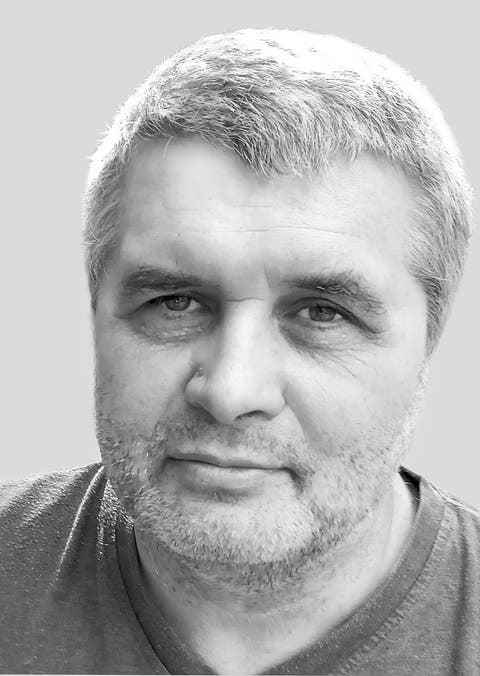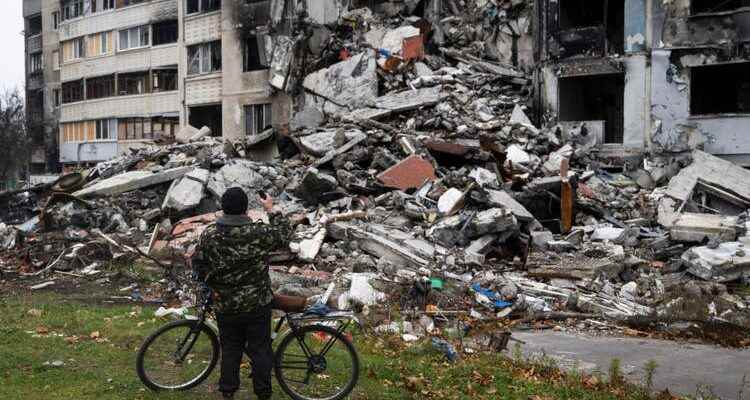Sergei Gerasimov is holding out in Kharkiv. In his war diary, the Ukrainian writer reports on the horrific and absurd everyday life in a city that is still being shelled.
Severely damaged apartment building in Kharkiv, November 8.
November 15, 2022, morning
The situation in Kharkiv seems to be improving. The alarms rang again yesterday, but only two or three times, and it seemed like nothing was going to fall from the sky on our heads this time. But then, just before midnight, three S-300 rockets hit the sleepy town, killing no one. They hit an industrial plant, it was said. First the room lamp flickered, then my computer switched off and erased half an hour of paperwork. It got light again after a few minutes, which was a pleasant surprise. The internet stopped working properly, but after about half an hour everything was fine again.
On the whole, life has become quieter. We even removed the mattresses from our windows, which should have protected us from the glass fragments in the event of a rocket hit. The mattress in the kitchen is still hanging there, though, because we just can’t get around to removing it. And we don’t stick to the blackout rules quite so strictly anymore: sometimes our windows are lit up until 11 p.m.
We are told that we must be disciplined. When night falls, the enemies shall see nothing in their sad intentions. But we are too tired to obey, and sometimes no one bothers to turn off the stairwell light at night, which used to be unthinkable.
We know that if the “orcs” feel like destroying something or killing someone, they will destroy and kill whether we are disciplined or not. The much-vaunted and long-awaited American anti-aircraft systems may have flooded while crossing the Atlantic. It looks like we’re not getting them.
The war did not progress. Three people blew up a mine while mowing grass near a train station yesterday. The same thing happened to two others while doing roadworks. In addition, an old man stepped on a land mine and another man who was nearby was also injured. The area around Kharkiv and east of Kharkiv is the most heavily mined region in Ukraine and there is nothing we can do about it except be careful. In total, about two hundred thousand square kilometers of Ukrainian territory must be demined. That’s five times Switzerland.
Three collaborators caught in the Kharkiv region are facing trial. The first had agreed to work for the Russians as a police officer, which could cost him up to fifteen years in prison. The woman who agreed to work for the Russians as a vet will probably get ten years. A 57-year-old man who provided food for the invaders faces likely five years behind bars.
The enemy again shelled the inhabited areas of Kharkiv, Chuguiv, Vovchansk and Kupyansk districts. Here in the city, all we hear most of the time is the distant rumble of the explosions. Life has become comparatively safe, and even Central Park is now open to visitors again.
Cars are clustered around the central park. It seems unreal that in May, when we were able to visit the center for the first time, this area was deserted and anti-tank hedgehogs lined the empty streets as far as the eye could see. Crowds of people, mostly families with children, are now strolling along the park paths. However, I don’t know what else there is for them to do there, because the rides are closed and the famous Ferris wheel, the tallest in Ukraine, is standing still. The man who kept it going died at the front in September.
The numerous visitors probably enjoy themselves by sitting in the small cafes or by feeding squirrels, who have become so fearless and tame that they snatch walnuts from people’s fingers, hide them somewhere and then come back for more. They’ll even climb up your pants and fiddle with your pockets to see if you’ve got any more nuts. They know that no one will harm them.
Small shops are starting to reopen. Those connected in any way to the military are thriving. The people who make military uniforms are as busy as a swarm of bees. Good milk of pre-war quality is now available again. It seems as if the cows slaughtered by Russian bombs and shells have miraculously risen again. But maybe they were too frightened and depressed to give milk for eight months. Now they have calmed down again.
There are rumors that the Ukrainian offensive did not stop even after the liberation of Kherson, which is very encouraging. But we know that the end of the war is still a long way off. Putin, alone in his underground bunker, is still trying to grow mushroom clouds. If he doesn’t succeed with the mushroom clouds, he can hatch something else evil. So we are prepared for everything. Or almost anything.
To person

Sergei Gerasimov – What is the war?
Of the war diaries written after the February 24 Russian invasion of Ukraine, those of Sergei Vladimirovich Gerasimov are among the most disturbing and touching. They combine the power of observation and knowledge of human nature, empathy and imagination, a sense of the absurd and inquiring intelligence. Gerasimov was born in Kharkiv in 1964. He studied psychology and later wrote a psychology textbook for schools and scientific articles on cognitive activity. His literary ambitions have so far been science fiction and poetry. Gerasimov and his wife live in the center of Kharkiv in an apartment on the third floor of a high-rise building. The NZZ published 71 “Notes from the War” in the spring and 69 in the summer. The first part is now available as a book on DTV under the title «Feuerpanorama». Of course, the author does not run out of material. – Here is the 57th contribution of the third part.
Translated from the English by Andreas Breitenstein.
